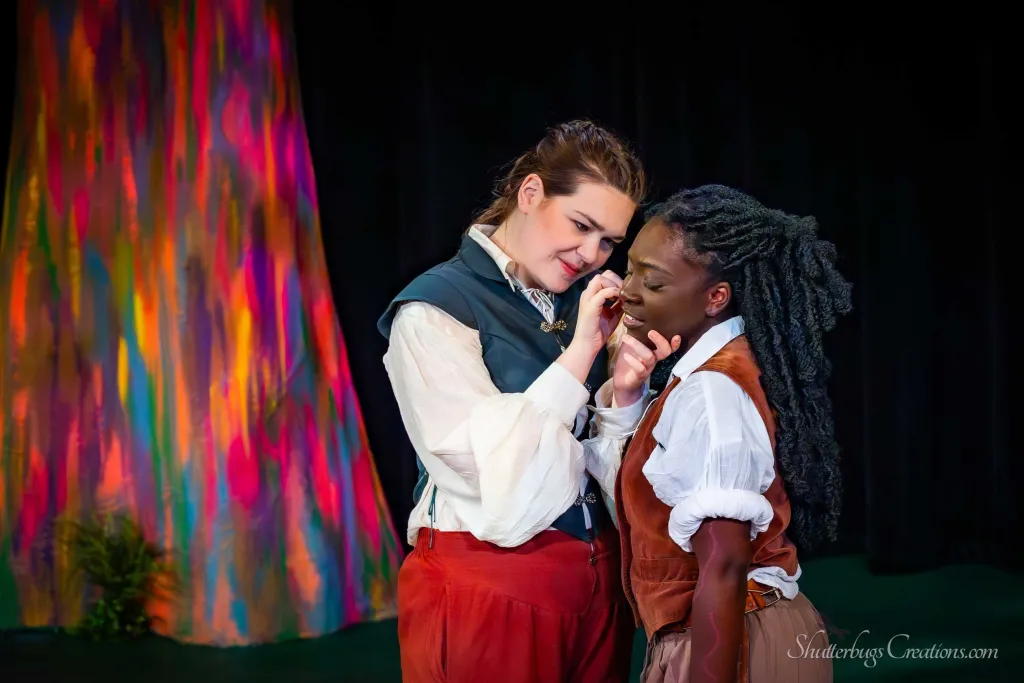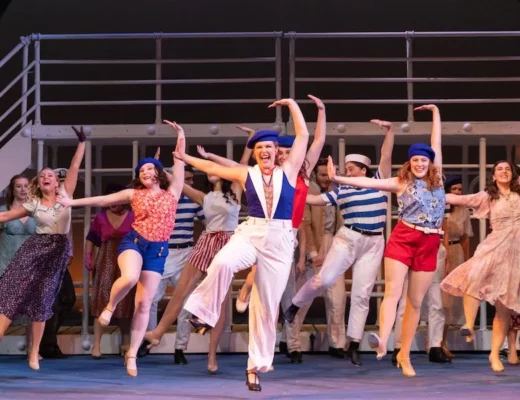By Teniola Ayoola
This article was originally published in Washington City Paper here.
Local small theaters may not always have the budget for elaborate sets or mind-bending special effects—especially when tackling mythological fare featuring Roman deities—but what Theatre Prometheus may lack in spectacle, it more than makes up for in heart, humor, and daring reinterpretation. In Galatea, a rarely performed 16th-century pastoral play by John Lyly, director Tracey Erbacher delivers a thoughtful and thematically rich production that reclaims ancient myth to tell a modern story of love unbound by gender or convention.
Set in a coastal village where, every five years, a virgin must be sacrificed to Neptune to prevent his wrath, Galatea opens with a nod to the belief that sexual orientation is predestined and unchangeable: “Destiny may be deferred, not prevented.” The heart of the story centers on two maidens—portrayed as a biracial couple—Galatea (Amber Patrice Coleman) and Phillida (Cate Ginsberg), each disguised as boys by their fathers to avoid becoming the sacrificial offering. Their fateful meeting leads to mutual confusion, comedic asides, and a tender unfolding of desire—performed with warmth and sincerity by both actors.
Most of the characters, including the male roles, are played by women and nonbinary actors—an artistic choice that prompts reflection on the fluidity of gender, identity, and affection. The ever-regal Diana (Rakell Foye), goddess of chastity, faces off with Venus (Marley Kabin), goddess of love, in a divine battle that mirrors the play’s central tension between virtue and passion. Anyone who has wrestled with the age-old tug-of-war between what the heart wants and what the head advises will recognize this mythic conflict—desire pushing against decorum, instinct clashing with expectation.
Yet it’s the lone male actor who arguably steals the show. Neptune, played thunderously and charismatically by Matthew Crawford, commands the stage with a booming voice befitting his volatile mythological persona. His performance strikes a clever balance between gravitas and levity—at one point cheekily polling the audience for an accent, landing on a crowd-requested Scottish brogue—before later delivering one of the play’s most distilled reflections on its core tension: “Diana must I honor for her chastity, and Venus must I worship for her love.”
Cupid, played by Tristin Evans and costumed with cheeky flair in pink and blue Converse and pastel tones (a clever design by Cheyenne Hill), serves as the impish instigator. With a wink and a bow, they enchant Diana’s virginal huntresses, causing the god to fall head over heels for Galatea and Phillida.
The production design, while modest, supports the storytelling. Simone Schneeberg’s set—featuring a shattered marble temple and glow-in-the-dark painted trees—offers a visually symbolic backdrop of the woods where much of the action unfolds. Sound designer Levi Manners enhances the atmosphere with rolling wave effects, grounding the sea god’s looming presence. A few technical enhancements, however, might have helped streamline the pacing—dimmed lighting or targeted spotlights during the lengthy asides, for instance, could have replaced the repeated back-and-forth sprints across the stage.
Still, these are minor quibbles in a production that excels at making centuries-old language feel accessible and immediate. One particularly memorable moment finds characters breaking the fourth wall to riff on the power of fate, comparing two real-life couples in the audience—one, they joke, bound by materialism; the other, by destiny.
When Galatea and Phillida eventually discover each other’s true identities, they pledge to do whatever it takes to remain together—a testament to how true love adapts and transforms itself in devotion to the other. In a contemporary context, the moment quietly echoes the societal pressures that make gender-affirming health care a necessary act of survival in order to avoid “hard chance in this world.” It’s a scene of radical kindness and quiet defiance, made all the more poignant by the play’s enduring relevance. “Love is greatest in name but lowest in virtue,” Diana proclaims. But in Galatea, though Cupid may meddle and destiny may delay, love—real, soul-deep love—emerges as a powerful force that transcends rules, roles, and even divine interference.





No Comments